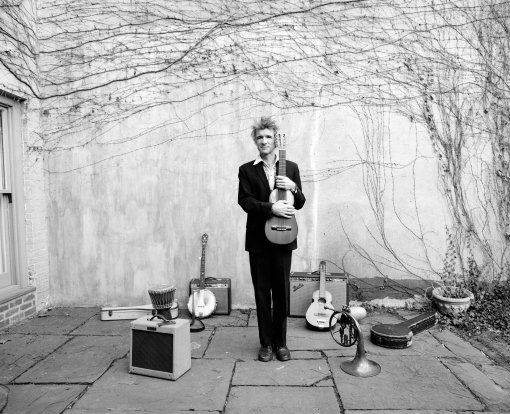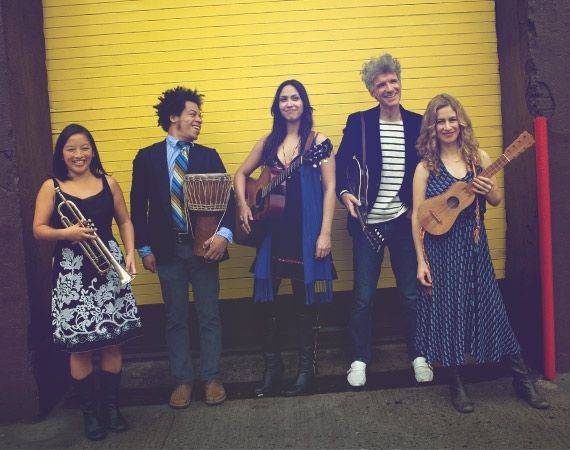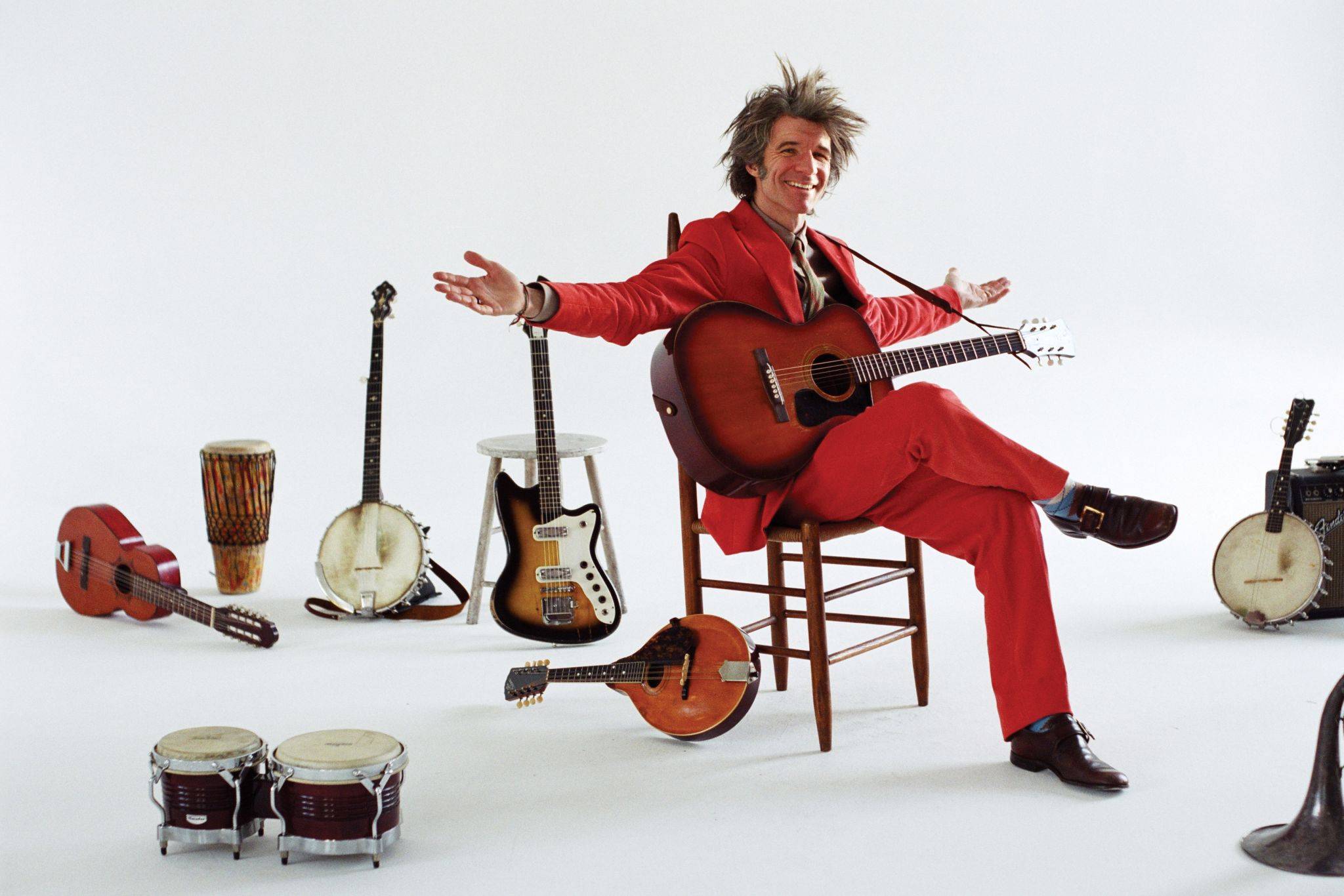Dan Zanes is much more than a children’s artist. His Grammy-award winning ensemble Dan Zanes and Friends has been performing American music together since 1999 and while their audiences are always full of singing and dancing children, he is one of the few “children’s” artists that adults genuinely enjoy alongside the kids.
Perhaps it’s because there is always something to learn about American music at a Dan Zanes show. Zanes takes a wide view of the “American” musical tradition. His performances and albums draw together music and musicians from all walks of American life and history. He is deeply committed to exposing people, young and old, to the American vernacular tradition. Along with his Grammy-winning album Catch That Train (2007), he has an album that collects some of the best songs from Carl Sandburg’s famous 1927 “American Songbag” (Parades and Panoramas, 2004), he also has an all-Spanish record celebrating Latino culture in America (Nueva York!, 2008) and even a reggae album recorded with frequent-collaborator Father Goose (It’s a Bam Bam Diddly, 2007). He is also a wonderful songwriter who uses these traditions as a template for his many fantastic original compositions.
Dan Zanes and Friends plays ELLNORA: The Guitar Festival on Saturday, September 7th at 10 a.m. He also will be playing a score he wrote to accompany Buster Keaton’s 1928 film Steamboat Bill, Jr. at 2:30 p.m. on the same day. We had the opportunity to speak with Dan Zanes last week about his music, his long relationship to ELLNORA, and his new record Turn, Turn, Turn.
Smile Politely: When I think about your current work with Dan Zanes and Friends, I can’t help but think of Pete Seeger—for decades he worked to keep American “folk” music in the public conversation. I see you as doing much the same thing. What is your relationship to or experience with American vernacular and traditional music? Why do you think it so well-suited to your family audience?
Dan Zanes: Well, it’s all just based on my own experience. That’s all I have to go on because I never studied it. But, my life’s been changed by it. When I was a kid I was listening to Lead Belly records and I could picture Lead Belly in my kitchen playing his guitar and I could picture myself right there with him which made me think, “Wow, music is something you make in your house and this is something that I can do.” So I had that experience early on. When I started making family music I would read Pete Seeger talking about participation—and if you were to sum it up in one word that would be it, “participation.” If you wanted to tack on some other words you could say, “joyous,” and “mysterious,” “available for one and all.”
And so, thinking about parents and families and thinking about this consumer culture that we live in, I was noticing when my daughter was born that a lot of people would go to the stores and get CDs—and I can understand that! I thought it was all about recorded music too: “What’s the first song I’m going to play for my daughter?” It never even occurred to me that I can play it myself! I was thinking about what record am I going to play for her. So as a parent, even though I had those experiences as a young person, I still wasn’t able to draw on them and connect the dots and bring that into my own parenting. So I would see people in my neighborhood and see them go to the store and get a couple CDs for their children. But, inevitably I think this generation is maybe less satisfied with things that are too commercial, or don’t have the proper amount of soul. Because, you know, a lot of us grew up on R&B and rock ‘n roll and I think we wanted a shared experience. So I just thought that maybe there’s an all-ages thing that we could we could all be listening to together. From that came the idea that we should be listening together, sure, but we should really be playing together. So as I started thinking about that I made a real effort to get back to folk music and music that called for participation and to think about all-ages music as apposed to children’s music. It’s the old fashioned way! My mom used to take us to Pete Seeger concerts and she’d say, “Oh we’re going to go see Pete Seeger and we’re all gonna sing!” That’s what we knew about Pete Seeger—he’s the guy that gets everybody singing. And what a good thing that is. And it’s so easy! That’s the thing, these older songs are made to be sung. It’s an interesting time now around Brooklyn because when we think about folk music, we’re not thinking about the old guys trying to do it like Pete did it. Now you see hipsters with skinny jeans walking down the street with five-string banjos. It’s crazy but, I think it’s coming back.
SP: I hope so. I don’t see a lot of that participatory stuff happening at the various shows that I go to. I hope to see more of it. It seems like there is something there that is really missing which is one of the reasons we look forward to your shows, Dan. We always sing at Dan Zanes concerts.
Zanes: Hey, thank you! That makes it easier and it makes it more fun. I think I’ll always spend my life looking at Pete Seeger in awe of his skills as a song leader and a sing-along leader. But if we all hold ourselves up to that standard then we wouldn’t even get out of bed in the morning. Just thinking that if we could all, to one degree or another, sing with other people and do our best to follow the masters.
SP: Absolutely. Another thing that you and Pete Seeger have in common is a concerted effort towards representing diversity in your music. You work hard to represent different traditions and different ethnicities, you sing and record music in languages other than English, and your band itself is ethnically and racially diverse. Can you talk about the importance of diversity a bit—aabout giving people a broader picture of what America and American music is?
Zanes: Yeah. Well, that’s what I love about Carl Sandburg. He, I think before anyone else that I’m aware of, tried to include as much music from the crazy quilt of American culture as possible. He was doing it in the 1920s with the American Songbag. That was my problem from the very beginning with the family music and music for children available now was that it made it sound like we were living in an all-white world (with a few notable exceptions—Ella Jenkins and [the band] Sweet Honey in the Rock). There is a tremendous amount of music from the Anglo traditions and very little else. I wanted to make music that sounded like my neighborhood. Maybe more importantly, I wanted kids in the audience to look up at the stage and see themselves up there playing. My band is multi-racial—it looks far more like New York than the rock band I used to play in [the Del Fuegos]: four white dudes with electric guitars.
And I think that’s important. Not to get too far into it, but the images that most young people are seeing are primarily white people and I think there’s a negative message behind all that. It makes it look like this is a white people’s world that we live in. I think it’s important that we all do our part to make sure its a more just and a more inclusive society. So, I think that is one of the opportunities that I have is try and make music and play in a band that is more representative and send a message to young people that this is something that everybody does and we can do it together.
SP: Lovely.
Zanes: I could go on and on but I won’t! [laughs]

SP: You’re now one of the few artists who have played at every ELLNORA: The Guitar Festival. This year you’re on the bill twice. The second thing you’ll be doing this year is performing music you composed for Buster Keaton’s 1928 silent film Steamboat Bill Jr. How did that come about?
Zanes: The Guitar Festival invited me two years ago, I think, to do something as part of a Buster Keaton series. So I wrote a score for Steamboat Bill Jr. and drummer Colin Brooks and I performed it. And I’ve been wanting to do it ever since. It was such a great challenge and it’s an incredible movie. I had seen Mark Ribot doing his music for The Kid, the Charlie Chaplin movie, a couple years ago and it just blew my mind and I’ve been wanting to this ever since. I’m very grateful to the guitar festival for giving me the chance. I felt really good about the music I made. It’s going to be a treat for me to revisit it. I hope to be able to tour with it to some degree because it’s extremely satisfying to be in a band with Buster Keaton!
SP: Your have a new record out this month: Turn Turn Turn with Elizabeth Mitchell. What can you tell us about it?
Zanes: Getting back to Pete Seeger, I think that everyone would agree that without Toshi Seeger, his wife, there would be no Pete Seeger. About fifty years ago when Pete wrote “Turn, Turn, Turn.” Toshi said, “As great as they are, these words are kind of heavy. Why don’t you write a version for young people? Pete said, “Why don’t you do it?” And she did. She wrote some amazing lyrics and they sat in a notebook for about fifty years. [Pete] recently re-discovered them and started singing them. Someone sent us a video tape as [Elizabeth Mitchell and I] were preparing our songs for this record (and Elizabeth is the person I love the most in family music; her aesthetic is the closest to mind–handmade barn doors and rusty-nails sound). So, somebody sent me a video of Pete Seeger singing “Turn, Turn, Turn” with Toshi’s lyrics and we all just realized at that moment that it was something we needed to be doing. So we recorded it.
And then we went out to Pete and Toshi’s house to get their blessing and spent time with them and their daughter Tina. And so we spent an afternoon at the dining room table with Pete Seeger! It was sort of a dream of a lifetime that I never thought would happen for me. He is so generous and so encouraging. And that has kind of been our experience making this whole record. Everything just fell into place from beginning to end. To spend time with Pete and Toshi and to have the opportunity to get their blessing for this song that has so much meaning for all of us it made the experience very very special, as you can imagine.
SP: Absolutely. What an amazing opportunity. Sad to see Toshi go [Toshi Seeger died on July 9, 2013].
Zanes: I know. It really was. It made it even more special to us that we had the opportunity be with the two of them together. You know, what was nice, what that she got a lot of… everything that was written about her since gives her the credit that she so deserves. It was really very moving to see the outpouring of love for her—the acknowledgement of what she did to give Pete the opportunity to do what he did. Seeing the two of them together made it very clear that he couldn’t have been Pete Seeger without her.

SP: Yes. Can you say a bit more about your partner on the record, Elizabeth Mitchell?
Zanes: Yeah. She lives up in Woodstock. She plays in a family band with her husband Dan Littleton and their daughter Storey who is now twelve. The three of them have been making family music as long as I have. And it’s always the music that I recommend to people when they ask what else there is that’s out there. They are on Folkways Records and like me make music drawing from a variety of traditions, old and new songs together—right in the Folkways bag. It’s the 21st century version of what Folkways is. So it’s not a throwback sound; there’s rock ‘n roll in there too. But it’s gentle music, very very handmade sounding.
So, we’ve been talking about collaborating for years and finally had a chance. I feel like this the best thing that I’ve been a part of for a long long time. I wrote five songs for the record and I think they are really some of my best songs. And we made it in three days! That part was good too. We rehearsed in Brooklyn and recorded in Woodstock so it’s kind of the sound of both places.
Catch Dan Zanes tomorrow, Saturday, September 7th at 10:00 a.m. (Tryon Fetival Theatre, $5-15 with Dan Zanes and Friends) or 2:30 p.m. (Dan Zanes: Buster Keaton’s Bill Steamboat Jr., Colwell Playhouse, $5-12) at ELLNORA: The Guitar Festival at Krannert Center for the Performing Arts.








